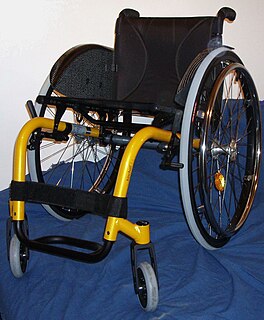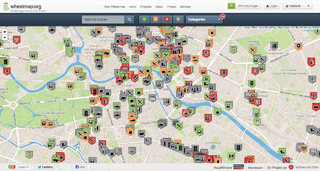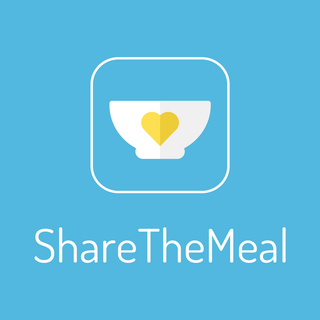Projects
The project Pfandtastisch helfen makes it possible for customers to donate their bottle recycling receipts at supermarkets. The funds raised from the receipts are donated to other nonprofit organisations throughout Germany. The food bank in Berlin, Berliner Tafel, for instance, was able to raise more than 100,000 euros per year in this way. The project Wheelmap.org is an online map for finding and marking wheelchair accessible places. Users can mark public places such as cafés, cinemas, stores and doctor's offices using a simple traffic light system, which indicates if a place is fully, partially or not at all wheelchair accessible. [1] The project gained national fame because of a Google Chrome TV advertisement featuring the map and its founder, Raul Krauthausen. The map is available in 22 languages on the website and as an iOS, Android (operating system) and Windows Phone app.
In May 2012 Sozialhelden introduced the project BrokenLifts.org. The project’s aim is to create a central platform where users can inform themselves about the state of repair of elevators in public transportation systems. Starting in November 2011 information regarding malfunctioning elevators in the two transportation systems in Berlin was collected and analyzed hourly. On October 8, 2014 a revised version of the service was launched in cooperation with the public transportation providers Verkehrsverbund Berlin-Brandenburg, the S-Bahn Berlin GmbH and the Berliner Verkehrsbetriebe. Elevators in the system report their operational state to BrokenLifts.org and the malfunctioning elevators are shown on the website and app of the service. In addition, the broken elevators are also shown on the online schedule of the transportation providers. Currently the project is limited to the Berlin region, but a collection of data nationwide is envisioned. On August 16, 2012 the organisation published the project Leidmedien.de in cooperation with the Robert Bosch Stiftung. The project, which was developed together with several journalists, is directed at reporters and commentators who work for the press, in radio broadcasting or other media. It gives directions and support on what phrases and expressions to employ when writing about people with disabilities, without stigmatising them. The aim of the site is to raise the public’s awareness by making journalists consider the way language shapes our realities and thus has the power to represent people with disabilities in a realistic way, devoid of stereotypes. The project also gives a voice to people with a wide spectrum of disabilities, giving them a platform for perspectives that are rarely heard in the mainstream media. Sozialhelden emphasize that Leidmedien is not there to instruct journalists but rather to sensitise and change perspectives and give support in finding appropriate language.

Accessibility in the sense considered here refers to the design of products, devices, services, or environments so as to be usable by people with disabilities. The concept of accessible design and practice of accessible development ensures both "direct access" and "indirect access" meaning compatibility with a person's assistive technology.

Physical accessibility of the Massachusetts Bay Transportation Authority system is incomplete. As is true for most mass transit systems, much of the Boston subway and commuter rail lines were built before wheelchair access was a requirement under the Americans with Disabilities Act of 1990. The MBTA has renovated most stations to become compliant with the ADA, and all stations built since 1990 are accessible. The MBTA also has a paratransit program, The Ride, which provides accessible vehicles to transport passengers who cannot use the fixed-route system.

Astoria Boulevard is an express station on the BMT Astoria Line of the New York City Subway. Located on 31st Street between Astoria Boulevard and the Grand Central Parkway in Astoria, Queens, the station is served by the N train at all times, as well as by the W train on weekdays.

The Friedrich Ebert Foundation is a German political party foundation associated with the Social Democratic Party of Germany (SPD), yet independent of it. Established in 1925 as the political legacy of Friedrich Ebert, Germany's first democratically elected President, it is the largest and oldest of the German party-associated foundations. It is headquartered in Bonn and Berlin, and has offices and projects in over 100 countries. It is Germany's oldest organisation to promote democracy, political education, and promote students of outstanding intellectual abilities and personality.
Accessibility for people with disabilities on the Toronto Transit Commission (TTC) system is incomplete but improving. Most of the Toronto subway system was built before wheelchair access was a requirement under the Ontarians with Disabilities Act (ODA). However, all subway stations built since 1996 are equipped with elevators, and elevators have been installed in 41 stations built before 1996. More than two-thirds of Toronto's subway stations are accessible. In 2014, the TTC began introducing new low-floor vehicles on its streetcar network. These accessible vehicles ultimately replaced the ageing, non-accessible Canadian and Articulated Light Rail Vehicle streetcars by December 29, 2019. In December 2015, the TTC retired the last of its lift-equipped high-floor buses, which were introduced in 1996, making all 170 bus routes 100% low-floor accessible.

An accessible toilet is designed to accommodate people with physical disabilities. Persons with reduced mobility find them useful, as do those with weak legs, as a higher toilet bowl makes it easier for them to stand up. Additional measures to add accessibility are providing more space and grab bars to ease transfer to and from the toilet seat, and including enough room for a caregiver if necessary. Some countries have requirements concerning the accessibility of public toilets. Toilets in private homes can be modified (retrofitted) to increase accessibility.

Accessible tourism is the ongoing endeavor to ensure tourist destinations, products, and services are accessible to all people, regardless of their physical or intellectual limitations, disabilities or age. It encompasses publicly and privately owned and operated tourist locations. The goal of accessible tourism is to create inclusivity of all including those traveling with children, people with disabilities, as well as seniors. This allows those with access requirements to be able to function as an independent using products following the universal design principle, a variety of services, and different environments.

A wheelchair is a chair with wheels, used when walking is difficult or impossible due to illness, injury, problems related to old age, or disability. These can include spinal cord injuries, cerebral palsy, brain injury, osteogenesis imperfecta, motor neurone disease, multiple sclerosis, muscular dystrophy, spina bifida, and more.

Ottmar Georg Edenhofer is one of the world's leading experts on climate change policy, environmental and energy policy, and energy economics. His work has been heavily cited. Edenhofer currently holds the professorship of the Economics of Climate Change at the Technical University of Berlin. Together with Earth scientist Johan Rockström, economist Ottmar Edenhofer is scientific director of the Potsdam Institute for Climate Impact Research (PIK), representing the interdisciplinary and solutions-oriented approach of the institute. Furthermore, he is director of the Mercator Research Institute on Global Commons and Climate Change (MCC). From 2008 to 2015 he served as one of the co-chairs of the Intergovernmental Panel on Climate Change (IPCC) Working Group III "Mitigation of Climate Change".
Design for All in the context of information and communications technology (ICT) is the conscious and systematic effort to proactively apply principles, methods and tools to promote universal design in computer-related technologies, including Internet-based technologies, thus avoiding the need for a posteriori adaptations, or specialised design.
Viva con Agua de Sankt Pauli is a charity founded in 2006 in the Hamburg quarter of St. Pauli. Viva con Agua is a network of people and organizations committed to establish access to clean drinking water and basic sanitation for all humans worldwide. Creative and joyful activities raise awareness for the global issues water, sanitation, and hygiene and simultaneously raise funds for worldwide water.
The physically integrated dance movement is part of the disability culture movement, which recognizes and celebrates the first-person experience of disability, not as a medical model construct but as a social phenomenon, through artistic, literary, and other creative means.

Mifinder was an iPhone app currently available from 2012 to 2014. It was aimed at LGBT groups who share a common life experience, and used a mobile phone's Global Positioning System to locate users.

Wheelmap.org is an online, worldwide map for finding and marking wheelchair accessible places, developed by the German nonprofit organisation Sozialhelden e.V. Anyone can find and add public places to the map and rate them according to a simple traffic light system. The map, which is based on OpenStreetMap, was created in 2010 by a team around social entrepreneur Raul Krauthausen to help people who use wheelchairs or wheeled walkers to plan their days more easily. Parents pushing a baby carriage can also benefit from the Wheelmap information. Currently almost 600,000 public places worldwide can be found on the map. About 300 new places are added on a daily basis. Wheelmap is available on the website and as an app for iOS, Android and Windows Phone.

Raúl Aguayo-Krauthausen is a German disability rights activist. He studied Social and Economic Communication at the Berlin University of the Arts and Design Thinking at the HPI School of Design Thinking. He was awarded the Order of Merit of Germany and is an Ashoka Fellow.
The Social Reporting Standard (SRS) provides a standardized reporting guideline for initiatives and projects in the non-profit sector. The term SRS is inspired by the Financial Reporting Standards of for-profit companies.
Narayan Seva Sansthan, established in 1985, is a non-profit charitable organisation based in Udaipur, Rajasthan. It is known for providing philanthropic services in the field of treatment and rehabilitation of polio affected people without discrimination of religion, region, caste, or gender.

ShareTheMeal is a crowdfunding smartphone application to fight global hunger through the United Nations World Food Programme (WFP). It enables users to make small donations to specific WFP projects and to track its progress. As of April 2020, ShareTheMeal has over 2 million downloads and 58 million meals shared. Google awarded ShareTheMeal as one of the Best Apps of 2016 in the "Most Innovative" category. At Google I/O in May 2017, ShareTheMeal won the Google Play Award for Best Social Impact.

The physical accessibility of the Metropolitan Transportation Authority (MTA)'s public transit network, serving the New York metropolitan area, is incomplete. Although all buses are wheelchair accessible in compliance with the Americans with Disabilities Act of 1990 (ADA), much of the MTA's rail system was built before wheelchair access was a requirement under the ADA. This includes the MTA's rapid transit systems, the New York City Subway and Staten Island Railway, and its commuter rail services, the Long Island Rail Road (LIRR) and Metro-North Railroad. Consequently, most stations were not designed to be accessible to people with disabilities.

AXS Map is a user-generated database of accessible locations in all major cities. Powered by GoogleMaps API, AXS Map functions by providing users with a database of locations that they can edit with ratings and reviews of accessibility metrics for disabled individuals. This in turn allows other users to see these reviews, screening which locations they choose to travel to, and adding their own reviews of the places they enter to expand the database. Rather than leaving accessibility reviews to specialists, AXS Map allows any member of the public to use the tool to report their experience. As well as offering accessibility ratings for the mobility impaired, AXS Map also reviews accessibility for the visually and hearing impaired.













